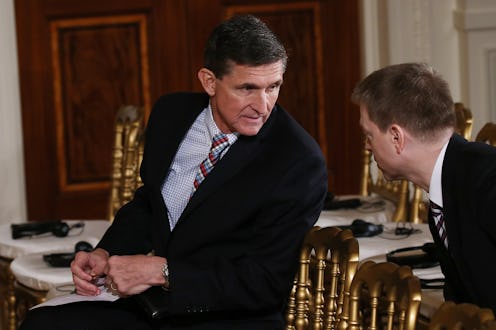News
Flynn Steps Down As National Security Adviser

After controversy over his alleged connections with Russia, National Security Advisor Michael Flynn has resigned from his position, CNN initially reported. In the meantime, the current National Security Council chief of staff, Keith Kellogg, will be taking over as acting head of the National Security Council, POLITICO reported.
Flynn's resignation followed accounts that the Justice Department had reportedly warned the president's team last month that Flynn could potentially be blackmailed by Russians. The former national security advisor had allegedly misrepresented his communications with Russia's Ambassador to the U.S. Sergey Kislyak to President Donald Trump's administration, according to CNN.
A transcript of Flynn's December conversation with the Russian ambassador, which he allegedly told Vice President Mike Pence was "limited to small talk and holiday pleasantries," was examined by the White House, Trump administration officials reportedly told The New York Times. Following this, Flynn allegedly wrote in his resignation letter, "I inadvertently briefed the Vice President-elect and others with incomplete information regarding my phone calls with the Russian ambassador. I have sincerely apologized to the President and the Vice President, and they have accepted my apology," CNN reported.
Contradictory reports on Flynn's status had come from the White House before his resignation: On Monday White House counselor Kellyanne Conway told MSNBC that "General Flynn does enjoy the full confidence of the president." On the other hand, White House Press Secretary Sean Spicer was more cautious, telling POLITICO, "The president is evaluating the situation … He's getting input, he's looking at the situation."
And on Feb. 8, the day before The Washington Post published a report alleging Flynn and the Russian ambassador had discussed sanctions, Flynn twice denied having done so. Then, on Thursday, his spokesman alternatively said "that while he had no recollection of discussing sanctions, he couldn't be certain that the topic never came up."
This isn't the first time Flynn's relations with Russia came under scrutiny; in 2015, Flynn was paid to attend the anniversary celebration of Russia Today, a Kremlin-controlled TV network, The New York Times reported. Despite Flynn's following of protocol by notifying the Defense Intelligence Agency of his presence at the event, some senior agency officials reportedly told the Times they were "surprised" by footage of the banquet, during which Flynn was seated next to Russian President Vladimir Putin.
Before Flynn's resignation became public, House Minority Leader Nancy Pelosi told POLITICO in a statement that his "conduct was alarming enough before his secret communications with Russians were exposed. Now, we have a national security adviser who cannot be trusted not to put Putin before America."
Flynn had a different take on his conduct in his resignation letter, writing:
Throughout my over thirty three years of honorable military service, and my tenure as the National Security Advisor, I have always performed my duties with the utmost of integrity and honesty to those I have served, to include the President of the United States.
Flynn, the former head of the Defense Intelligence Agency, is the shortest-serving national security advisor, having held the position for under a month. Retired Gen. David Petraeus is scheduled to meet Trump at the White House, leading some to speculate that he may replace Flynn, POLITICO reported.